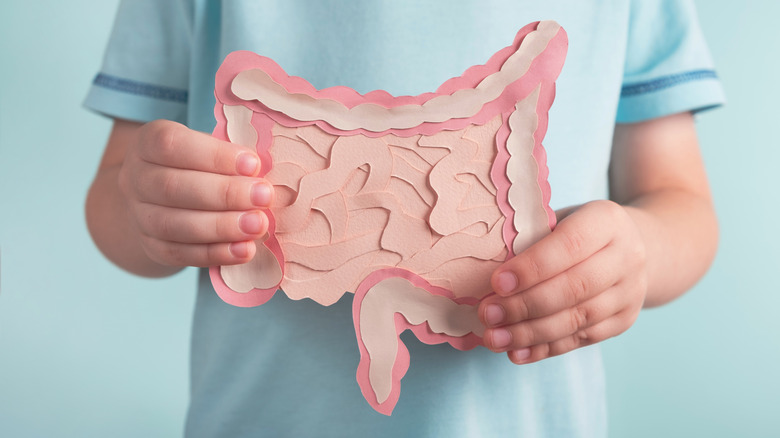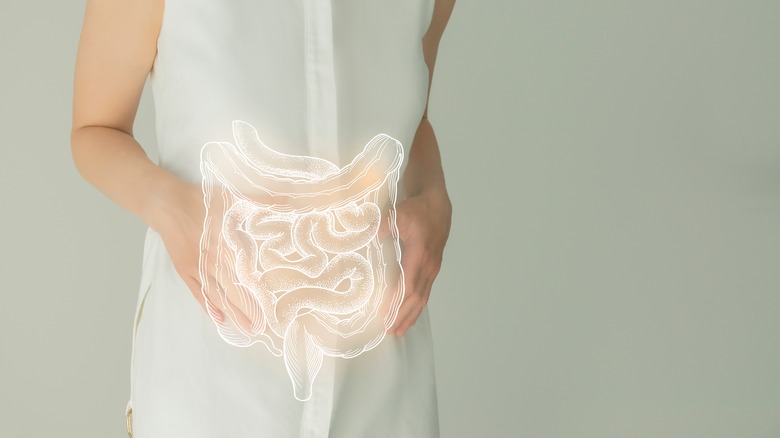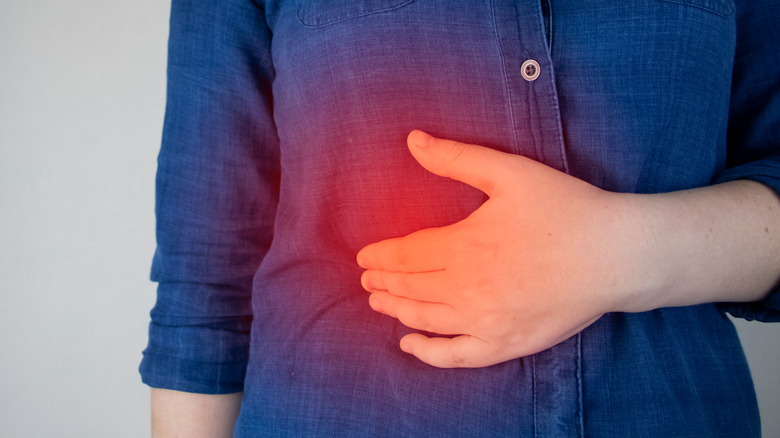What It Means When You Have Mucus In Your Stool
Mucus is a thick, slimy substance that is produced by the body's mucous membranes. According to Cleveland Clinic, mucous membranes are found in many areas of the body, including the nose, throat, lungs, and digestive tract. Mucus has many benefits and serves a number of important functions in the body. First, it helps moisten inhaled air and acts as a lubricant, which helps to protect the tissues and organs (via Medical News Today). Mucus also acts as a filter, trapping dust and other particles that can damage the body's tissues. Likewise, it helps defend the body against infection thanks to its natural antibiotics that help to fight off infection by binding to and neutralizing harmful microorganisms, explains Cleveland Clinic.
The color, texture, and amount of mucus can vary depending on various factors such as allergies, infection, inflammation, or other underlying medical conditions, says Medical News Today. Also, if you are noticing mucus in your stool, it is normal to have it in small amounts. However, when there's a large amount of mucus in your stool — or if the mucus is accompanied by other symptoms such as abdominal pain or changes in bowel movements — it could be a sign of an underlying health issue.
Crohn's Disease
According to Medical News Today, mucus in the stool is a common symptom of Crohn's disease, an inflammatory bowel disease (IBD) that affects the digestive tract. It can affect any part of the digestive tract but most commonly affects the small intestine and the beginning of the colon. People with Crohn's disease have a thicker layer of mucus in their digestive tract. The exact cause of Crohn's disease is not known, but it is thought to be a combination of genetic and immune factors (via the Mayo Clinic).
Symptoms of Crohn's disease can vary from person to person and can range from mild to severe. Common symptoms include abdominal pain, diarrhea, weight loss, fatigue, and fever, explains Mayo Clinic. Some people may also experience pain around the anus, inflammation of the skin and liver, and iron deficiency, per the clinic.
Crohn's disease is typically diagnosed through a combination of physical examination and various tests such as blood tests, stool tests, and imaging studies (such as X-rays or CT scans).
Irritable bowel syndrome (IBS)
Irritable bowel syndrome (IBS) is another chronic condition where mucus in the stool presents itself as a symptom, explains Healthline. IBS usually affects the large intestine and is characterized by a group of symptoms, including abdominal pain or discomfort, bloating, and changes in bowel habits such as constipation or diarrhea, per the Cleveland Clinic. According to the clinic, IBS is classified into three subtypes based on the predominant symptom. IBS-D (diarrhea-predominant symptoms), IBS-C (constipation-predominant symptoms), and IBS-M (mixed symptoms). According to a 2016 study published in the International Journal of General Medicine, diarrhea-predominant IBS is more likely to cause mucus in stool than constipation-predominant IBS.
The exact cause of IBS is not known, but it is thought to be a combination of factors such as muscle contractions, a dysfunction in the way the brain and gut communicate, an imbalance of gut bacteria, infection, and stress (via Mayo Clinic). According to the National Health Services (NHS), the symptoms of IBS can vary from person to person and can range from mild to severe. Common symptoms include abdominal pain, bloating, and excess wind, says the NHS.
Ulcerative colitis (UC)
According to Medical News Today, ulcerative colitis (UC), a type of inflammatory bowel disease (IBD), can also cause mucus in stool. It is characterized by inflammation of the colon and rectum due to ulcers developing in those areas, per the National Health Services (NHS). An increase in mucus secretion occurs during flare-ups.
The NHS reports that the exact cause of UC is not known. However, it's believed to result from an abnormal immune response to the bacteria in the gut, causing inflammation and damage to the colon. In addition to the immune system, genetic and environmental factors also contribute to the condition. The symptoms of UC vary from person to person, and can range from mild to severe. Common symptoms include abdominal pain, diarrhea (often bloody), and rectal bleeding (via the NHS). Some people may have occasional symptoms, while others may have symptoms that are present most of the time, explains the source.
UC is typically diagnosed through a combination of medical history, physical examination, and various tests. These include blood tests, stool tests, and imaging studies.
Colorectal cancer
Colorectal cancer, also known as colon cancer, usually affects the rectum and colon (parts of the large intestine). The colon and rectum are responsible for absorbing water and electrolytes from indigestible food material and storing and expelling the remaining waste material, per the Canadian Cancer Society. According to Mayo Clinic, the cancer typically develops over a period of time. In its early stages, it often has no symptoms. Colorectal cancer usually starts with the formation of polyps (benign growths) in the colon. As it progresses, it can cause symptoms such as blood in the stool, abdominal pain, and changes in bowel habits. People may also see mucus alongside the blood, says Medical News Today.
The exact cause of colorectal cancer is not known, but certain risk factors have been identified, such as age (colorectal cancer is more common in people over 50), a family history of colorectal cancer, a history of inflammatory bowel disease (such as Crohn's disease or ulcerative colitis), and a diet high in red meat and low in fruits and vegetables (via Mayo Clinic).
How is mucus in stool treated?
If you are experiencing increased mucus in your stool or other unusual symptoms, it is important to see a healthcare professional for evaluation and treatment. They can help determine the cause of the mucus and recommend the appropriate treatment. According to Medical News Today, treatment for mucus in the stool will depend on the underlying cause.
Treatment for IBD conditions — like Crohn's disease — may include medications such as anti-inflammatory drugs, immune-system suppressors, and antibiotics to reduce inflammation and control the symptoms (via Mayo Clinic).
Treatment for IBS may include dietary changes such as avoiding foods that trigger symptoms. People with IBS symptoms may also benefit from taking probiotics, over-the-counter, and prescription medications to manage symptoms such as diarrhea, constipation, and pain, per Cleveland Clinic. If the mucus in the stool is caused by an infection, the treatment will depend on the specific type of infection. Bacterial infections may be treated with antibiotics, while viral and parasitic infections may require other types of medications.
Treatment for UC depends on the severity of the condition and can include medications such as anti-inflammatory drugs, immune system suppressors, and antibiotics. In some cases, surgery may be required to remove the damaged portion of the intestine, per the NHS.
If the cause is colorectal cancer, the condition is typically treated with a combination of surgery, chemotherapy, and radiation therapy, per Mayo Clinic.






